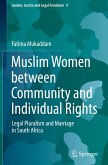This book presents new perspectives on gender-based violence (GBV) in South Africa. It argues that violence against women is a manifestation of unequal gender relations and harmful manifestations of hegemonic masculinity, which are governed by patriarchal beliefs, institutions and systems. It includes chapters on quantitative research that assess not only the levels and determinants of violence against women but also men's attitudes towards gender-based violence, perceptions of violence, the legislative frameworks governing violence against women in South Africa, and the current cases and jurisprudence relating to this scourge.
In spite of its focus on South Africa, the book also provides insights for comparative scholars exploring the value of different constitutional articulations of human rights and how they support (or fail to support) efforts to combat violence against women. By assessing recent incidents and responses to gender-based violence, the book provides aview of not only the societal but also jurisprudential opportunities and pitfalls in this area that may be applicable elsewhere. Gender equality and, central to this, the right of women to live lives free of violence, is a precondition for full democratic participation and is a universal goal. Accordingly, the South African experience contributes to a wider understanding of the possibilities and limitations of societal and legal reform in challenging the ubiquity of violence against women.
The book is aimed at researchers, practitioners, students, professionals and advocates in the field of gender-based violence.
In spite of its focus on South Africa, the book also provides insights for comparative scholars exploring the value of different constitutional articulations of human rights and how they support (or fail to support) efforts to combat violence against women. By assessing recent incidents and responses to gender-based violence, the book provides aview of not only the societal but also jurisprudential opportunities and pitfalls in this area that may be applicable elsewhere. Gender equality and, central to this, the right of women to live lives free of violence, is a precondition for full democratic participation and is a universal goal. Accordingly, the South African experience contributes to a wider understanding of the possibilities and limitations of societal and legal reform in challenging the ubiquity of violence against women.
The book is aimed at researchers, practitioners, students, professionals and advocates in the field of gender-based violence.








